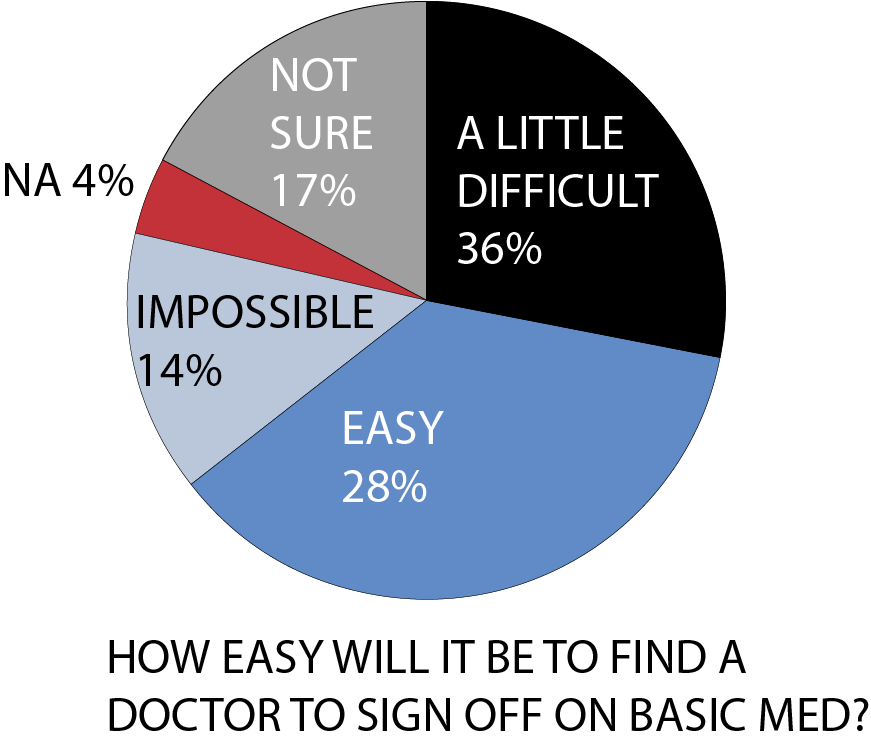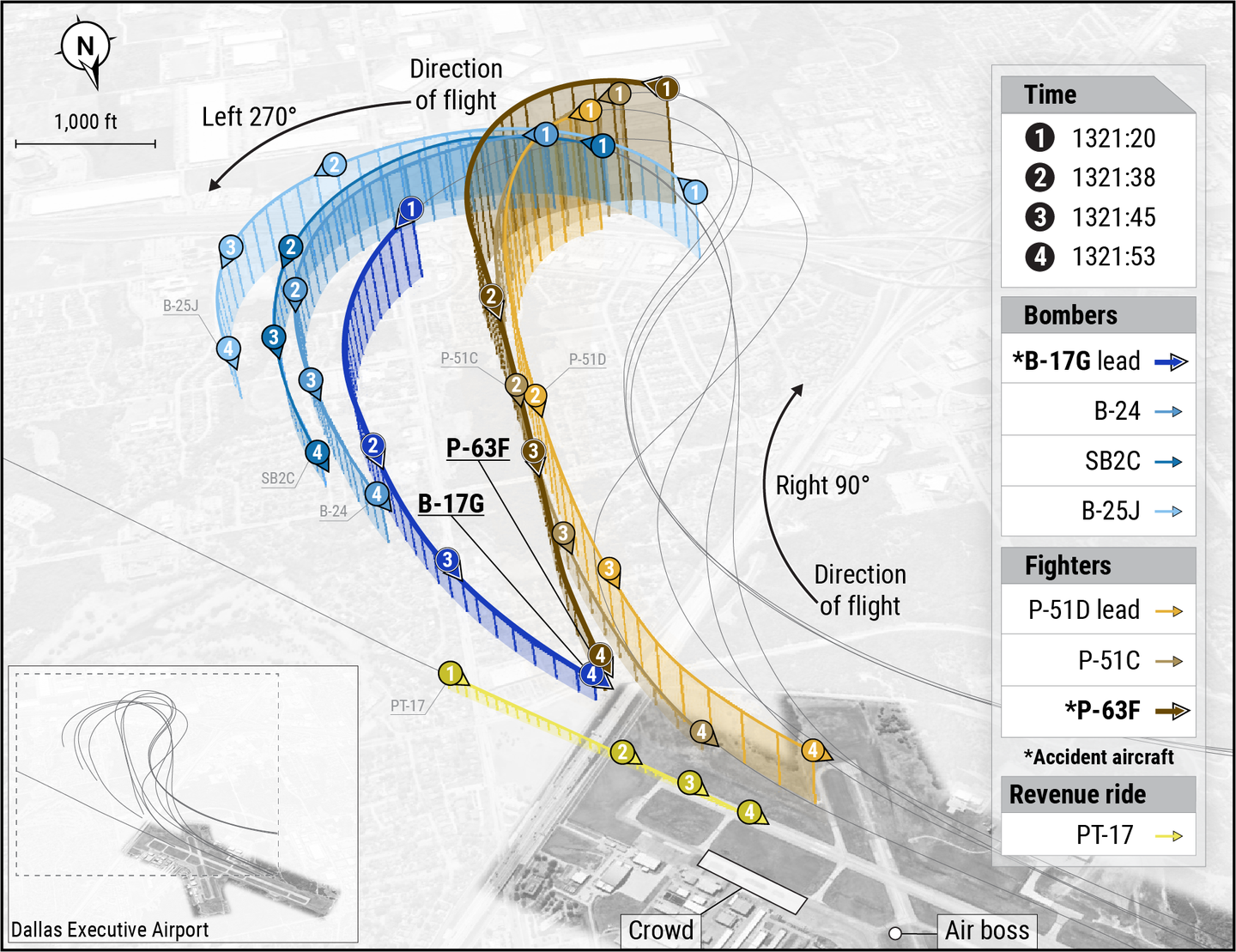BasicMed Survey: Disappointed Resignation
Readers really wanted the driver’s license medical cert. And they believe it’s deserved.

After a month on simmer, what do AVweb readers think aboutthe FAA's new BasicMed Third-Class medical exemption rule? Our recently completed survey provides a glimpse and if I could characterize the overall mood, I'd call it disappointed resignation.
Why the disappointment? If there's any common theme in the responses we received on the survey it's that readers expected and wanted a driver's license medical standard similar to the sport pilot rule. The fact that BasicMed falls short of this this drew a steady stream of ire. "Third-Class medical exemption using a driver's license was very important. This BasicMed turkey is irrelevant," wrote reader David Dean in one of dozens of unvarnished, blunt comments we received.
To summarize, we published the survey on AVweb in early January and received 1966 responses, a fairly large number for this sort of thing. The vast majority of respondents had active Third-Class medicals and some 20 percent were flying on special issuances. An unknown number were flying under the sport rule on driver's license certs. That pilots were interested in medical reform is shown in the graphic at left. More than 90 percent of respondents followed the Third-Class exemption closely or very closely.
Similarly, a large number of pilots told us that having this medical exemption is important to their personal flying. Forty-five percent called it very important and another 32 percent said it was somewhat important. But having read over the proposed rule—it doesn't go into effect until May 1, 2017—pilots seem less thrilled with the results. "I see no difference between a Third Class and the BasicMed, other than four years and somewhat less FAA involvement, and ultimately more costs," commented one reader. (Not all readers agreed to our request to use their names for this report.)
Related to this was our question about how readers think BasicMed will stimulate aviation activity. Here, the opinions may be a little more encouraging as shown in the graph summary at right. It suggests a majority think BasicMed will help and 15 percent think it will be very effective. But those who left comments on this question weren't expecting much. "It won't slow the decline any. This legislation is useless," wrote James Koper. We would say his comment was in the majority. But at least some readers think BasicMed can't help but stimulate some activity, by either keeping owners in airplanes they might have otherwise sold or by breaking loose some sales. "The used airplane market will explode upward," commented another reader.
When readers were asked if BasicMed would make them consider keeping an airplane they might otherwise not, a third said yes and nearly a third said no. However, many of our readers and respondents to the survey already own airplanes so it's biased toward owners. That may explain why only 17 percent of respondents said BasicMed would make them consider buying an airplane, new or used. More than half said BasicMed will have no bearing on that decision, but again, it may be because they're already owners.
One thing we hadn't figured on is that BasicMed may have an effect on owner decisions to equip with ADS-B. "It removes the financial risk from an avionics (WAAS GPS, ADS-B Out GPSS, navcomm et al.) upgrade, so instead of postponing, now I'm scheduling to begin soon," one commenter told us. We also asked if any light sport owners would consider moving into a certified airplane now that medical certification worries are off the table. Surprisingly, there weren't enough LSA owners in the sample to make any sense of the question. I think this suggests that light sport pilots have crossed the divide on medical worry and just don't even think about it enough to answer a survey.
Clearly, the chief worry among pilots is finding a doctor who will sign the BasicMed checklist, a draft of which appears in AC 68-1. (We don't know if it will change in the final form, but it's not likely to, since the draft reflects the legislative direction from Congress.) I noticed a dichotomy in the responses. As the graph shows, not quite a third of respondents thought it will be easy to find a doc while more than a third thought it would be a little difficult. Fourteen percent said impossible.
But in the comment fields, the remarks were more strongly negative; not universally so, but the majority of commenters said liability concerns will keep doctors from participating in BasicMed. "I can't believe that the FAA wants everyone to believe that it took six months to make a copy of the 8500-8 form. I personally don't see much benefit in the whole dog-and-pony show program. If you presently have a valid state driver's license, there is no reason that you cannot pilot a aircraft. The medical profession is not going to want intrusion by another government agency," wrote one commenter.
"My doctor already said no, and all the other doctors at my medical plaza said the same. The reason is obvious: Liability. FAA knew this, that's why it passed so easily," commented Michael Livote. To be fair, a number of readers said their doctors had already agreed to sign off on BasicMed and others said their docs would.
On a personal note, I saw my own doctor—non-AME—this week and brought along the AC 68-1 checklist. The news isn't good. He said the medical group doesn't sign such declarations when they are asked for driving permits and I doubt if they're going to make an exception for aviation. He promised to hand it off to the group's legal counsel. I'm sure mine won't be the only such request.
AOPA and EAA say they're both aware of this potential problem and are developing educational programs for non-AME doctors. For now, as the survey indicated, the entire success of the program remains unknown if doctors won't participate. On the other hand, AMEs may step into the breach and scoop up some new business. Or at least reduce the erosion of pilots abandoning traditional medicals.
Last speaking of AOPA, readers recognize that the alphabets were instrumental in lobbying the BasicMed enabling legislation. But that's not the same as saying they think the advocates did a good job. The survey was full of complaints like this one: "The compromise they reached was a huge failure. It is bad policy. AOPA was more concerned with getting a win than with getting it right," wrote one reader. "AOPA was started by a doc. Do I need to say more?" added Melvin Freedman. Still, despite these negatives, less than 5 percent of readers said AOPA and/or EAA made no difference. "They helped get it passed, but could not prevent poison pill inclusion," added reader Mark Foringer.
Additional Comments:
"I can't believe that the FAA wants everyone to believe that it took six months to make a copy of the 8500-8 form. I personally don't see much benefit in the whole dog-and-pony show program. If you presently have a valid state driver's license there is no reason that you cannot pilot an aircraft. The medical profession is not going to want intrusion by another government agency."
"Can't see where BasicMed did much except going from two to four years to get a medical. With most of the same requirements it looks like FAA got a little vindictive after we/congress went around them. I was expecting/hoping it would be fairly easy for your family doc to do the medical but the way it looks, I doubt if many non-AMEs will want to go to the trouble or take the risk."—Dennis R.
"I think it will get increasingly difficult to find a doctor who will sign the checklist. As non-AME doctors become more aware of the liability concerns, fewer will be willing to sign. At the same time, fewer doctors will become AMEs due to the reduced demand for services. It will become more of an issue to find an AME within a reasonable travel distance." —John McNerney
"I am excited that it will be implemented! May 1, 2017."—Wylie M. Smith
"I feel let down. I see this as an attempt by the FAA to keep the regulations in their favor as opposed to what was laid out in the Pilot's Bill of Rights."
"This new rule did nothing more than appease ALPA and the FAA. It will be more difficult to get a medical because the general physician will be reluctant to accept the liability. Additionally, there is no physical exam requirement to drive a car, which is what was originally sold to the flying public. The checklist of the BasicMed medical exam is quite detailed. It will be simpler and cheaper to go to an AME. Furthermore, even though the FAA says that the medical findings by your private physician will be confidential, all bets will be off if there is an accident or incident that requires an FAA or NTSB investigation."
"It' about time this happened. Now we just need the training and test to be published and available to everyone ... quickly and not at the last minute."—Frederick Williamson
"A reasonable solution to the problem. Took about 20 years too long."
"Having a special issuance cert, I am relieved to have the BasicMed opportunity. I don't mind the weight/pax restrictions because I don't do that kind of flying. I will be getting with the AOPA medical experts because I have questions relating to my special issuance cert."
"I will be recommending some of my students pursue the BasicMed program. The biggest frustration to me is the FL180 limitation. I'm not sure what makes FL180 a big deal when pilots can fly under IFR with the BasicMed program. I could understand FL280 to stay below airline traffic in RVSM airspace. For pilots with a turbocharged piston airplane, it can be a fairly significant limitation to be required to stay below FL180."—David Richardson
"BasicMed is a good first step, but it should not be considered a complete solution. AOPA and EAA should continue to push for refinements to streamline the process and work towards a true driver's-license medical for Third Class, as per the original goal."—Dean DeRosia
"No doctor is going to sign this ... AME is the only option. I know my doctor that I get a yearly physical--and I am in great condition--will not be allowed to sign by his group and he would not sign this if he was on his own. They will get strong recommendations by their insurers and their organizations to not sign. This is a waste of time and effort since this inability to get a signed form will kill the program. Also, why do you think this makes it more likely that people will buy aircraft ... no relationship. What you should have done is get the Third Class medical to be every four to five years after 40 with an AME."—Manthou Tsiouris






